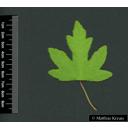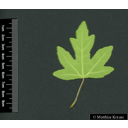Useful information about the taxon (species, subspecies, variety...)
Liquidambar orientalis Mill.
Altingiaceae
(APG IV)Oriental sweetgum, Turkish sweetgum
Taxon concept: The Plant List (2010)
Distribution: southwest Turkey, Greece: Island of Rhodes
Liquidambar orientalis Mill. - Accepted: Liquidambar orientalis Mill. bei Zander 2008; Familie: Hamamelidaceae (Zander 2008)Liquidambar orientalis Mill. - unresolved: Liquidambar orientalis Mill. bei The Plant List (2010); Familie: Altingiaceae (APG III)Liquidambar orientalis Mill. - Accepted: Liquidambar orientalis Mill. bei The Plant List (2014), version 1.1; Familie: Hamamelidaceae (APG III)Liquidambar orientalis Mill. - Accepted: Liquidambar orientalis Mill. bei The Plant List (2014), version 1.1; Familie: Altingiaceae (APG IV)
- Flowers
- monoecious flowers; male flowers in raceme-like inflorescences and female flowers in pendulous spherical capitate inflorescences
- Flower ecology
- wind-pollinated (anemophilous)
- Life form
- tree
- Foliage persistence
- deciduous
- Fruits
- capsule fruit
- Fruit ecology
- wind-dispersed (anemochorous)
- Soil conditions
- preferentially on rich, deep, moist soils
- Natural occurrence (habitat)
- floodplains, waterlogged riparian forests, marshlands, river banks, valley sides near streams, coastal areas, slopes
- Vegetation typ and synecology (plant community)
- temperate, mixed mesophytic broad-leaved deciduous forests; in associations with Platanus orientalis, Alnus orientalis, Quercus cerris and Salix alba
- Usage
- used for the production of balsam (‘Liquid Storax‘), sweetgum oil and incense; sweetgum oil is used as raw material in the perfume industry; sweetgum oil/resin is used as a chemical stabiliser, e.g. for cakes, and to make chewing gums; used as a medicinal plant; wood is used for firewood due to high content of flammable oil; used as an ornamental tree
Global Biodiversity Information Facilty (GBIF). Online Publication: www.gbif.org; Haider, M. et al. (2005): Wildbienenkataster. See: https://www.wildbienen-kataster.de; Schick, B. & Spürgin, A. (1997): Die Bienenweide. Eugen Ulmer Verlag, Stuttgart, Auflage: 4., völlig neubearb. u. erw. A., 216 S. 978-3800174188.; The International Plant Names Index (2009). Published on the Internet http://www.ipni.org; Courtesy to IPNI, 2009. Exported from IPNI at date: 2009-09-22 20:17:51; Westrich, P. et al. (2018): Die Wildbienen Deutschlands.. Ulmer Verlag ISBN 978-8186-0123-2.;
Diese Webseite verwendet Google Maps, um Karten und Standorte von Pflanzen in den Hohenheimer Gärten anzuzeigen. Dadurch werden unter Umständen Daten an Google weitergeleitet, was mit einer Verarbeitung Ihrer personenbezogenen Daten verbunden sein kann. Die Datenschutzerklärung von Google finden Sie hier: Datenschutzerklärung von Google
| Sex | Standort | Accession number | Planting year | Donation | IPEN | Lat. | Long. |
|---|---|---|---|---|---|---|---|
| Parzelle N | SP-NB-090-16478 | 2018 | + | XX-0-HOH-SP-NB-090-16478 | 48,7116199386 | 9,2165639481 |


